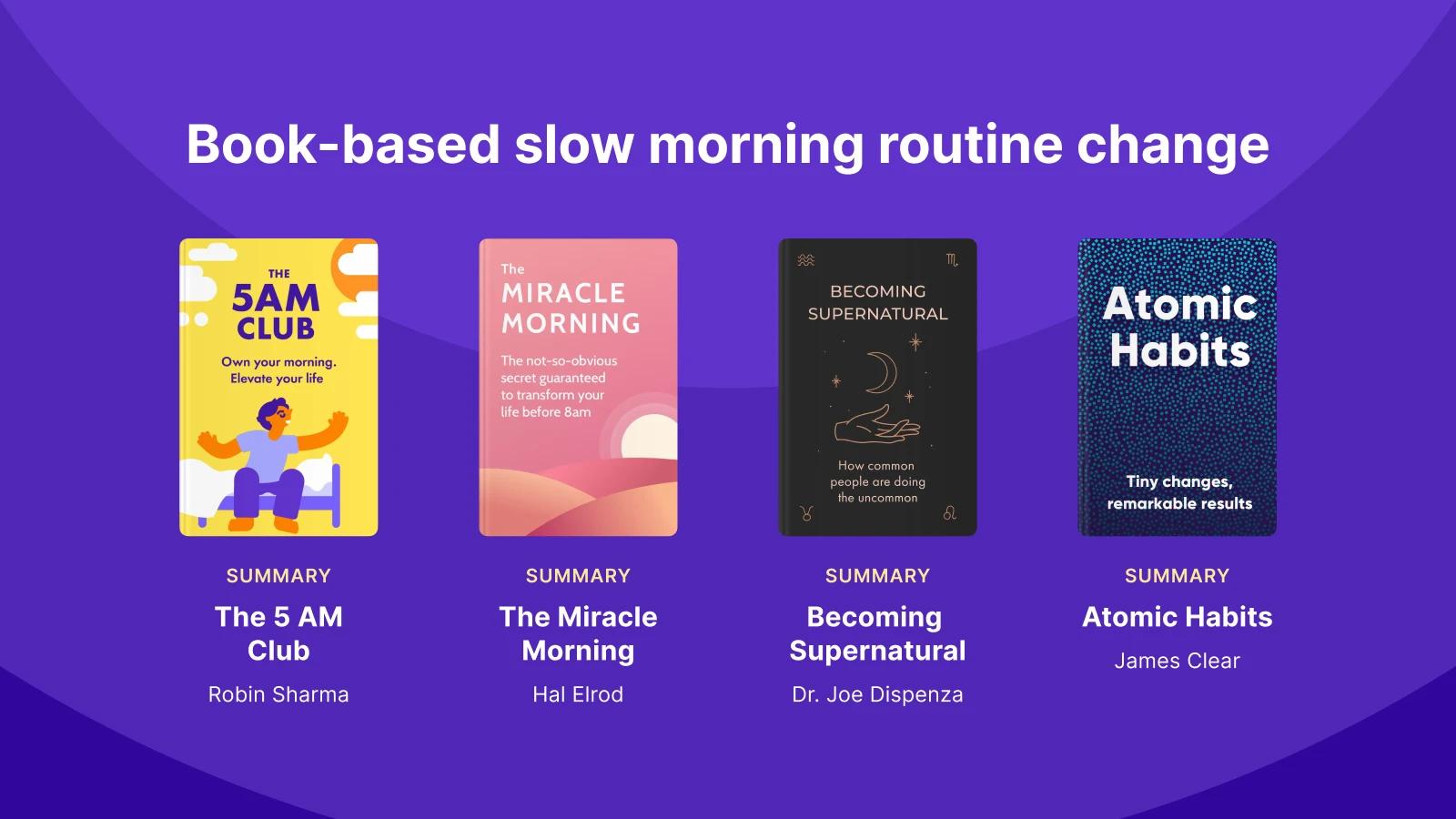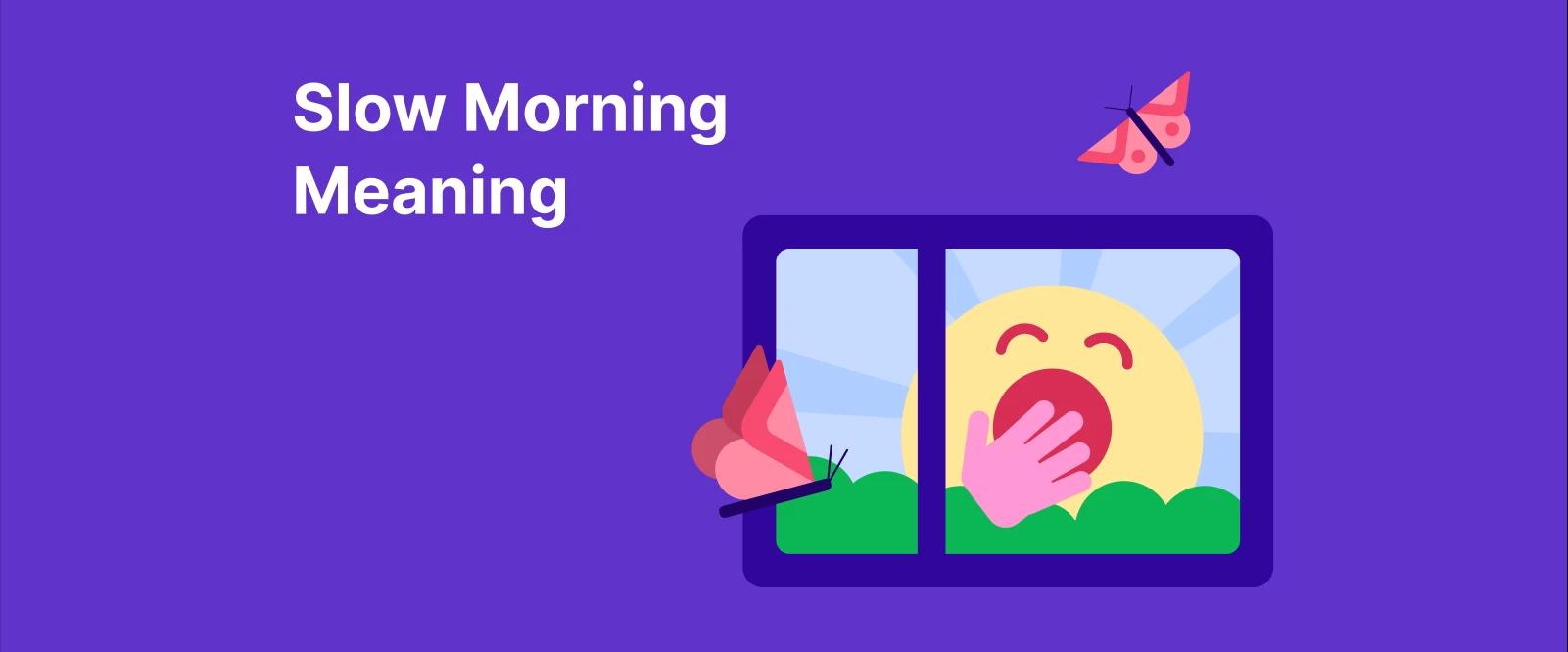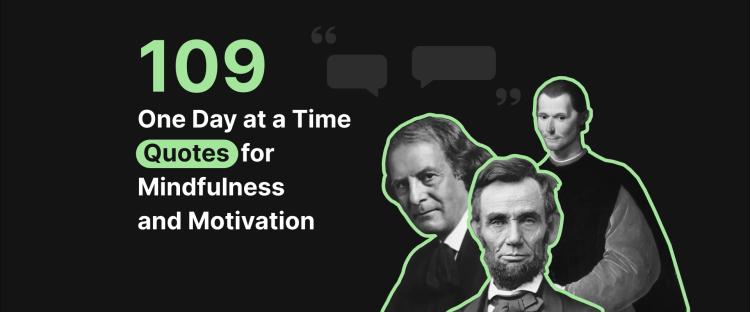Alarm clock sounds, work emails notifications, leaving a cosy bed — can mornings even be enjoyable? Then you open social media and see your friends doing yoga, self-care, and journaling. No, it's not a secret club for productive overachievers — these people apply the 'slow morning' lifestyle.
But what exactly is a slow morning? Is it just about getting up early and doing some activities? Not really.
Keep reading to learn more about the slow morning meaning. This article not only explains and offers examples of this concept, but it's also backed by the best book summaries from Headway's library, including 'The 5 AM Club' and 'The Miracle Morning.'
Thoughts from bestselling authors like James Clear, Robin Sharma, Laura Vanderkam, Hal Elrod, and Dr. Joe Dispenza on well-being, wellness, and a slow morning routine will help you create calmness in your chaotic mornings.
What does a 'slow morning' really mean?
A 'slow morning' refers to a relaxed, quiet, and slow-paced start to your day, without any stress or rush. You take time to do what makes you happy, mindful, calm, and ready for the day ahead. Some examples of a slow morning routine include:
Enjoying eating breakfast slowly
Journaling your thoughts for 10 or 15 minutes
Reading affirmations or good morning quotes
Going on a short morning walk
Doing meditations or yoga
This way, you don't feel anxious about doing work or chores during the day. These small, seemingly unimportant things can actually help calm your nervous system and make you less likely to feel burned out at work.
You can't create your future and succeed when you feel stressed and unsatisfied. Learn about this lifestyle in more detail from the 'Becoming Supernatural' summary.
Top five benefits of a slow morning routine
What are the main perks of waking up early and embracing a slow morning?
Lower anxiety level and reduced stress
Elevated mood and well-being
Boosted productivity and better focus
Higher sleep quality and physical health
Feeling energized to start the day
Many therapists and industry experts recommend trying a slow morning approach, as it benefits your physical and emotional well-being. Also, you can achieve much more with organized morning rituals.
As Hal Efrod shared, "Focused, productive, successful mornings generate focused, productive, successful days, which inevitably create a successful life." You can find this and many other motivational thoughts in 'The Miracle Morning' summary.
How to start a slow morning routine (step-by-step guide)
Here's how you can embrace slow living when you wake up early in the morning:
Try getting up without an alarm; let your body decide at what time you should get out of bed.
A gentle stretching or a 5-minute meditation will clear your mind.
Make breakfast and enjoy every minute of eating it.
Start planning your day by making notes in your digital or paper journal.
Read an affirmation or a motivational morning quote to kick off your day.
This is just a raw example of how you can start your morning. You can always personalize your routine by adding things you feel like doing the most. If you're a sports person, go on a jog or do some yoga in the park.
If you're a bookworm, read or listen to books from your to-read list — the 'Atomic Habits' summary is a great option for learning how to improve your daily routine.
Slow morning routines for parents, professionals, and students
It's challenging to manage mornings when you have children, a busy schedule, or academic responsibilities. Here's a quick overview of how to adapt a slow morning ritual based on your lifestyle.
| Lifestyle | Challenge | Slow morning approach | Benefit |
|---|---|---|---|
Parents | Children's schedules and chaos | Let your kids join you in making breakfast, don't rush them, enjoy the process | Less chaos and more quality time |
Busy professionals | Deadlines and tight schedules | Start your day with a cup of coffee, journaling, and planning | Better focus and reduced stress |
Students | Late nights and inconsistency | Try breathing exercises and reading one day at a time quotes | More clarity and emotional discharge |
Now, find out how a slow morning routine can be adapted in detail to your way of life.
Slow morning tips for parents with young children
Having kids isn't for the weak ones, right? They're the greatest gifts, but sometimes, they can also create the most chaos.
A tip to try: Don't wake up before your children; start the morning with them. Brush your teeth with them, put on some music for an energy boost, and let them help with breakfast. It doesn't have to be a hard-to-make meal — it's the process that matters.
Then, you're all following the same flow and spending much more quality time with each other. For more free time in the morning, ask your kids to do some chores in the evening, like prepping their bag or setting out their clothes.
How to have a slow morning before a hectic workday
Here's the catch: You don't need to spend an hour to have a meaningful morning routine. So, this practice fits hardworking, always-busy people too. Even 15 minutes can make your day less hectic and more productive.
A quick tip: Try no screen time after waking up early. Try starting your day without TikTok or any other social media app. Then, you choose a new habit to implement. It can be anything that sounds good, from journaling, gentle stretching, or simply reading.
Understandably, you don't have enough time to read full books, but you can opt for a bite-sized format and read or listen to the '168 Hours' summary — it takes only 15 minutes to learn how to use time more resourcefully.
Slow morning ideas for busy college students
Students tend to forget about self-care, so they'll definitely benefit from peaceful mornings. You don't have to be an early bird to feel productive and meet all deadlines. Half of the success is in planning. Wake up, take a deep breath, and don't open any social media.
Take a moment to prioritize your tasks, create a to-do list, identify blockers, if any, and come up with solutions. An organized slow start like this stimulates emotional and cognitive regulations.
A suggestion: If you can skip a morning class for a better regimen and submit the task later, do so!
Common mistakes to avoid when starting a slow morning routine
Slow morning really works! But sometimes not on the first try. Avoid making these mistakes when practicing a slow morning routine:
Setting the bar too high: Don't plan jogging, reading, cooking, and journaling in one morning. Pick a few low-effort things that make you happy and feel more mindful.
Inconsistency: A habit is formed when it's consistent; without this, there will be no positive outcomes.
Checking your phone when you wake up: It's an easy loophole to fall into, but don't start your day by checking emails or social media posts.
Not prepping the night before: If you can pack your lunch, set out your clothes, or literally do anything that will make your morning easier, do it!
Expecting results right away: Your well-being will improve over time, so don’t rush! It takes a lot of effort for your mind and body to get used to new things and create results.
In our fast-paced lives, we expect immediate results, which contradicts the concept of a slow morning. But being an early morning person can change your life. You can see it for yourself by reading or listening to the 'The 5 AM Club' summary — three amazing stories on productivity and increased performance.
Explore five top book summaries to change your slow morning routine!

Improve your daily habits and learn more about the importance of slow mornings with these top nonfiction books. FYI: You can find book summaries of these titles in the Headway app. We offer a bite-sized format — it takes only 15 minutes to read or listen to a summary, which is perfect for busy mornings.
'The 5 AM Club' by Robin Sharma
'The Miracle Morning' by Hal Elrod
'Becoming Supernatural' by Dr. Joe Dispenza
'Atomic Habits' by James Clear
'168 Hours' by Laura Vanderkam
Transform your mornings with Headway's book summaries!
Are you ready to try a slow morning approach? On a new day, try engaging in mindful and relaxing activities after your skincare routine or a cup of coffee. If you need more reassurance that it's the way to go, download the Headway app and read or listen to expert advice.
Learning with Headway can also become part of your slow morning. Find some extra time to commit to this concept, as it improves your mental health and physical wellness.
Frequently asked questions about the slow morning meaning
How long should a slow morning be?
An optimal time for a slow morning is between 15 and 45 minutes. It shouldn't be too long or too short, either. Too much time for a morning routine can make you too relaxed to start the day productively. Also, short ones simply won't bring any positive results for your well-being. So, it's really about balance and personal preferences.
Is it okay to have a slow morning?
Yes, it's absolutely okay to have a slow morning. Many industry experts and professional therapists recommend this approach for individuals who always lack time or simply aren't satisfied with their morning routines. Just make sure you do something that will benefit your health, both physical and emotional.
Why is a slow morning the best way to start your day?
For several reasons, a slow morning approach is the best way to start the day:
It boosts your mood and overall well-being
You feel more in control of your life
More achievements due to planning
You adopt new habits
How can you slowly become a morning person?
To slowly become a morning person, try changing your sleeping habits. You can start by going to bed 25-30 minutes earlier than usual. Also, avoid electronics at least one hour before falling asleep. Try journaling or reading a book instead. These processes take some effort, so they might send you to sleep, helping you become a morning person.
What is a slow night, and how does it support a slow morning?
A slow night practice is similar to a slow morning: a calm night routine that allows your mind and body to rest. It also includes relaxing activities, like journaling or listening to a podcast. The main goal is to improve your sleep experience and wake up feeling refreshed.
What is the most popular wake-up time?
For adults in the US, the most popular wake-up time is 7 am. Many publications and surveys, like the American Time Use Survey, prove that number. This aligns with most work schedules and school timetables. However, the perfect wake-up time is solely individual, as it depends on several factors, such as lifestyle, habits, and work.
Why are slow mornings trending?
Slow mornings are trending because more and more people are seeking mindfulness and relief. This concept exists as a counterbalance to the hustle culture. Especially after COVID-19, many individuals have lost their balance and are spending too much time inside. Also, the slow morning trend is promoted by many influencers and experts.













